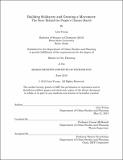Building solidarity and growing a movement : the story behind the People's Climate March
Author(s)
Young, Lisa (Lisa Jean)
DownloadFull printable version (12.71Mb)
Alternative title
Story behind the People's Climate March
Other Contributors
Massachusetts Institute of Technology. Department of Urban Studies and Planning.
Advisor
Ceasar McDowell.
Terms of use
Metadata
Show full item recordAbstract
On September 21, 2014, 400,000 people converged on the streets of Manhattan for the People's Climate March (PCM), making it the largest climate change demonstration in U.S. history. Under a banner that read "Frontlines of Crisis, Forefront of Change," the march was led by low-income people of color and indigenous peoples -- those most affected by the health, environmental, and economic impacts of climate change and the broader fossil fuel industry. Never before had the social justice implications of climate change been given such prominence at a major U.S. climate protest, where environmental policy themes often dominate. This thesis tells the story of how these unique features of the PCM came to pass, as uncovered through literature research and interviews with core PCM organizers. By first tracing the history of the "climate movement" since the early 1990s, this research exposes a deep division between two streams of the movement -- the mainstream Climate Action (CA) camp, led by privileged white environmentalists, and the more radical Climate Justice (CJ) camp, led by frontline communities of color -- and reveals how the PCM arose from a timely and intentional planning partnership between the two. By directly addressing historically recurrent issues around trust, leadership, funding, framing, and strategy, the PCM planning team developed a collaborative framework that produced more equitable processes, sustained relationships, and just outcomes. As both arms of the climate movement acknowledge the simultaneous necessity and immense challenge of achieving deeper solidarity, the story of the PCM partnership shows that by engaging in shared work, CA and CJ groups may begin to dismantle the barriers that exist between them, grow the size and diversity of the climate movement, and rightfully lift up the voices of those that have long articulated bold calls for change from the frontlines of the climate crisis.
Description
Thesis: M.C.P., Massachusetts Institute of Technology, Department of Urban Studies and Planning, 2015. Cataloged from studednt-submitted PDF version of thesis. Includes bibliographical references (pages 75-79).
Date issued
2015Department
Massachusetts Institute of Technology. Department of Urban Studies and PlanningPublisher
Massachusetts Institute of Technology
Keywords
Urban Studies and Planning.